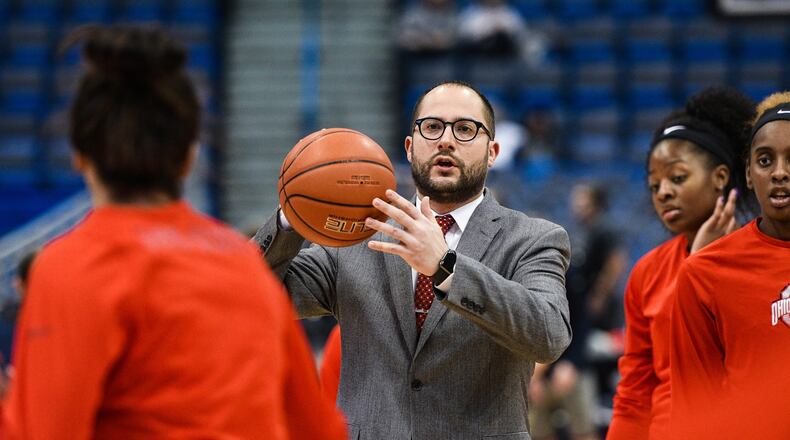Former Ohio State women’s basketball assistant coach Patrick Klien and former fencing coach Vladimir Nazlymov both were found guilty of aggravated level I violations while former women’s golf head coach Theresa Hession was found guilty of a level II violation.
Most of the penalties involved were self-assessed and announced previously, including postseason bans for all three programs, but on Tuesday the department of athletics announced it has vacated women’s basketball Big Ten championships and NCAA Tournament appearances from 2017 and ‘18 as well as the 2018 Big Ten Tournament title and a total of 52 wins.
The fencing program vacated three conference championships and NCAA championship runner-up finishes in 2016 and ‘17.
The infractions committee determined a charge of failure to monitor was not warranted because of the resources Ohio State devotes to compliance and its compliance program.
“To be clear, resource dedication alone does not fulfill the minimum compliance requirements,” the panel wrote, “but here the resources combined with the compliance program that Ohio State had in place outweighs the deficiencies identified by the panel.”
Ohio State athletics director Gene Smith said in a news release he is proud of the way the matter was managed by the university, the department of athletics and the sports programs involved.
“We are committed to our proactive and pre-existing system of compliance methods and rules education,” Smith said. “A comprehensive compliance program ensures adherence and institutional control over the athletics department and furthers the mission of the university. We are pleased that this matter is now behind us, and our focus remains on our student-athletes.”
According to the NCAA, Klein “initiated contact with student-athletes with the goal of forming personal relationships that exceeded coaching/student-athlete relationships.”
That included paying for manicures, loaning money for rental cars, and purchasing textbooks for a student-athlete who was not on scholarship.
Klein, who resigned in the summer of 2019 after his misdeeds came to light, also committed recruiting violations that include recruiting former players to help recruit prospective players and paying for bottle service at a club for two recruits.
Nazlymov provided more than $6,000 in recruiting inducements to three prospects and $8,000 in impermissible benefits in the form of free access to his local sports club.
The NCAA said Hession, who retired in December, frequently allowed practices to run long and failed to track athletes’ hours as required by the NCAA.
Neither Nazylmov nor Klein cooperated with NCAA investigators, which is also an NCAA violation, and both received 10-year show-cause penalties that put restrictions on their ability to coach at an NCAA institution.
The fencing and women’s basketball programs also self-assessed recruiting restrictions and scholarship reduction penalties, and the department was fined and placed on four years of probation.
About the Author

